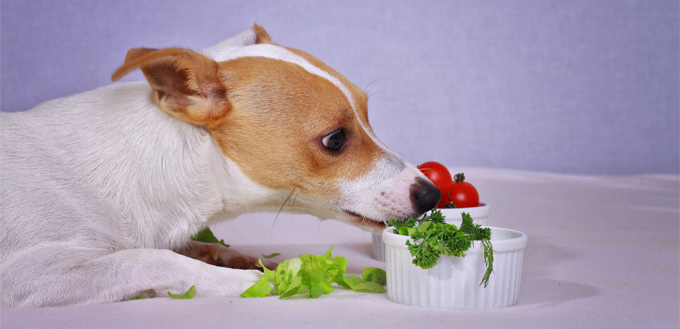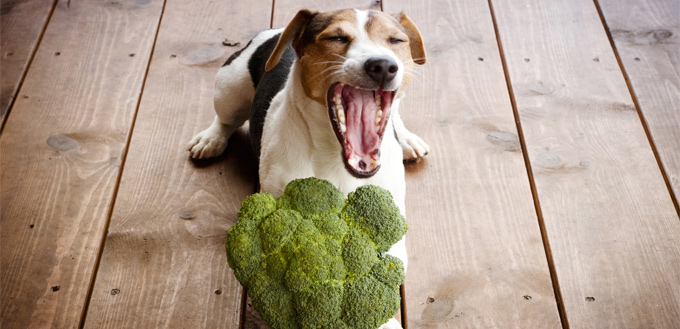There is no denying that veganism is on the rise in most developed nations right now. The most recent statistics from the UK and the USA alone indicate a huge rise in the number of people who are now vegan compared to just five years ago. It’s estimated that around 1 in every 100 people in the UK and 1 in every 200 people in the USA are currently vegan but the numbers are growing all the time. Retailers have not been slow to capitalize on the trend and supermarket shelves now contain many vegan ranges alongside vegetarian and meat-based options.
How does this impact on the canine companions in our lives? Two of the reasons that people become vegan are cited as animal welfare and environmental issues. If a vegan has concerns about the ethical issues presented by farming animals for meat and with the environmental impact that the meat industry has on our planet, these concerns will inevitably extend to the dog food industry. They may find it ethically unacceptable and abhorrent to feed their dog meat.
Their decision to swap their pooch onto a vegan diet may be well-intentioned but are they acting in their dog’s best interests? Whilst a carefully balanced vegan diet is recognized as a healthy lifestyle choice for humans, is that also true for the carnivorous canines in our lives? Here we explore the main issues around switching a dog to a vegan diet.

Are Dogs Actually Carnivores?
There is an on-going debate about how to classify the diet of dogs. Some experts describe them as carnivores (meat-eaters) whilst others label them as omnivores (able to eat both plants and meat). There are several physiological characteristics that indicate that dogs are well-adapted to a meat-free diet.
The large teeth at the back of their mouths (molars) have quite a flat surface which is useful for grinding up bones but it could be argued that it is also useful for chewing on fibrous plant material. Dogs are able to digest most of the carbohydrates found in plants. They also have a small intestine that takes up nearly a quarter of their total gastrointestinal tract. This is a typical omnivore feature (similar to humans and pigs) and is very different from the very limited volume of the small intestine found in truly carnivorous animals such as the cat. Also, the dog’s body is able to make vitamin A (an essential nutrient) from the beta carotene that is found in plants.
So, the science indicates that dogs’ bodies are not truly carnivorous like the cat species but are somewhere in between and could survive on a plant-only diet. That does not mean that it is the most healthy option for them. Also, the dog’s mind may not agree with their body! If you place a juicy steak and a pile of cabbage in front of a dog, I think we all know which one it would run towards.
What Is in a Dog Vegan Diet?
Switching your dog to a vegan diet is not something that should be done lightly or without a great deal of research. It is important to talk to a vet or animal nutritionist that has experience in this field and can support you. Vegan diets are healthier for humans but they are not healthier for dogs so the switch should only ever be made for ethical reasons. You are doing this for your own beliefs and not for your dog’s health.
Remember that you need to replace the nutrients that would have been provided by meat with something else. Meat provides most of the amino acids (protein) and many vitamins and minerals so you may need to use food supplements.
You May Also Like: Dog Weight Gain Supplements
In theory, there are plenty of foods that a vegan dog will enjoy including a wide range of vegetables such as sweet potatoes, carrots, broccoli, spinach, and kale. Beans are another good option but they can cause flatulence. Carbohydrates can be provided by rice, quinoa, and lentils.
Related Post: Dog Food for Flatulence
It is important to note that not all fruit and vegetables are safe for dogs to eat. Dogs can become very ill after eating the avocado skin, macadamia nuts, grapes, onion, garlic, and unripe tomatoes to name a few. A healthy vegan diet for a dog is NOT the same as a healthy vegan diet for yourself.
There are commercial vegan dog food options available now that you could try out if you don’t want to prepare your own.

The Potential Dangers of a Dog Vegan Diet
The potential dangers of a vegan diet for a dog cannot be stressed enough. This is why dog owners should only ever attempt the transition under guidance from a vet experienced in dog nutrition or from a certified dog nutritionist. There are some circumstances where a vet will recommend a vegan diet because a dog has allergies to the meat content of food but this is very rare. Most of the time, a vet will advise you to proceed with extreme caution and may advise you not to proceed at all.
Meat provides a number of essential nutrients that it will be difficult (but not impossible) for your dog to obtain elsewhere. It is not simply a matter of swapping a meat-derived nutrient for a plant-derived one. Taking proteins as an example, plant proteins are less digestible for dogs and get metabolized differently. Here are some examples of nutrients that a vegan diet will struggle to provide:
- Vitamin D3. Dogs cannot make vitamin D in their skin as humans can so they need it in their diet. They can only get vitamin D2 from plants and vitamin D3 is obtained from meat. They can get by with just D2 but it is not ideal. Vitamin D3 is important for skin and bone health.
- Taurine. This is a type of amino acid and so is one of the building blocks of the body. It is used in cell growth and repair. There is a condition called taurine-related dilated cardiomyopathy which results from a deficiency of taurine. In this condition, the heart becomes enlarged and cannot pump properly. Taurine deficiency can also result in problems with reproduction, poor growth, and poor eyesight. Most dogs will get their taurine intake from meat where it is found in large quantities. However, it is possible for a dog’s body to make its own taurine if it has the correct forms of dietary protein.
- Total protein. Most dogs will derive protein from meat which is a very protein-rich constituent of their diet. If a dog does not get enough protein, its cells cannot grow and repair. An intake of at least 25 grams per 1,000 calories is recommended. It is usually recommended that protein should make up between 15% and 30% of an adult dog’s diet.
- L-carnitine. This is essential for normal metabolism and for producing energy. Animal products are especially high in L-carnitine particularly beef and chicken. However, it is found in smaller quantities in whole wheat and in some vegetables.
- Calcium. Animal products are a great source of calcium which is needed to keep bones healthy and strong. Dogs who do not have enough calcium in their diet can develop rickets which makes the bones soft and fragile. Calcium deficiency can also cause muscle twitching, lethargy, restlessness, and stiffness as well as panting and convulsions in serious cases.
- Phosphorous. Calcium levels need to be balanced with phosphorous levels. In general, dogs need 1.2 parts of calcium for every 1 part of phosphorus. This can be very hard to achieve in a vegan dog diet. Meat and animal organs are the best source of phosphorous for dogs.
- Iron. When a dog is deficient in iron they can be weak, lethargic, and depressed. They may also have increased susceptibility to disease. Iron is usually provided by red meat in a dog’s diet.
Of all the above nutrients, the amino acids (proteins) are the biggest challenge. Commercially available vegan dog food will have been formulated to provide what your dog needs but if you are preparing your own food, you will need to use food supplements.
You May Also Like: Calcium Supplements for Dogs
Vegan dogs are more likely to develop struvite stones which are stones in the urinary tract. This is because their urine will be more alkaline.
An Alternative to a Vegan Diet
Many dog owners find that they are facing a dilemma. They want to stick to their vegan principles but they do not want to cause their dog any harm by imposing an inappropriate diet. If you are in this position right now, here are a few things for you to consider. There may be a way to ensure that your dog’s diet is both humane and environmentally sustainable but also contains all the nutrition that they need.
- Buy commercially available vegan dog food. This is the easiest and safest option although it may not be the cheapest. The formulations have been very carefully worked out to ensure that your pooch gets all the nutrients they need. You can even buy vegan dog treats and vegan dog chews.
- Consider allowing eggs or dairy. Discuss with your vet if you could substitute the meat in your dog’s diet with eggs or dairy products. Obviously, this is not strictly vegan but may avoid at least some of the ethical issues associated with meat production. This is still a radical change in diet for your dog and needs to be carried out with care.
- Use locally produced organic meat. You could prepare your own diet for your dog using meat that has been ethically produced. This often involves using organic farms in your area where you can find out details of the welfare safeguards for the animals. Organic farming also has a less detrimental effect on the environment. It also cuts down on the transport of meat products so it is more environmentally friendly. This type of meat product is more expensive and handling and using meat from any source may not be acceptable to all vegans and vegetarians.
- Use vegan dog treats. You could compromise and select vegan dog treats and vegan dog chews. It is certainly reasonable to introduce a few vegan meals a few times a month but sticks to a meat protein diet for the rest of the time. This will result in a healthy, balanced omnivorous diet which is the ideal diet for your dog’s metabolism.
- Adopt a fish-based diet. After taking veterinary advice, you could try swapping your pooch onto a fish-based diet where they will derive most of their dietary protein from fish instead of meat.
This is always going to be a personal decision. However, the welfare of your dog must always come first. Switching a dog to a vegan diet requires a lot of support and a lot of careful planning. Feeding any animal a ‘species-inappropriate’ diet is not something that you should take on lightly. Whilst it is true that you may be able to meet their basic dietary needs using supplements, it should be remembered that you are swapping natural nutrients for artificially derived products. This may also conflict with your vegan beliefs and values.
Anyone who puts a dog onto a vegan diet must be prepared for enhanced health monitoring and check-ups to make sure that the dog is not suffering. The problem is that some deficiency diseases can take months if not years to show and by the time you notice it, it may be too late.
Finally, there are plenty of pets (including rabbits) who are natural vegans and may be a more appropriate pet for you.
Note: The advice provided in this post is intended for informational purposes and does not constitute medical advice regarding pets. For an accurate diagnosis of your pet's condition, please make an appointment with your vet.





